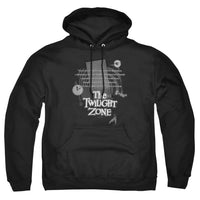7 films and TV shows that inspired David Lynch’s 'Twin Peaks'
You can find traces of 'The Fugitive,' 'The Mod Squad' and more in Lynch's landmark series.

It’s been forty years since David Lynch snuck onto the midnight movie scene with his peculiar and controversial indie hit Eraserhead. His successive work has matched that film’s displaced ease. Lynch’s movies don’t just scandalize; they probe at American idealism with a surrealist spin unique to him.
On his 70th birthday, we remember Lynch’s hit TV series Twin Peaks — returning to TV screens in 2017 — about a Washington town with strange inhabitants and even stranger goings on.
Instead of noting all that Twin Peaks influenced, we look back on the pop culture that made Twin Peaks possible, from Rod Serling to Russ Tamblyn to The Mod Squad.
1. The Twilight Zone

An obvious but important one. It’s hard to imagine Twin Peaks without Rod Serling’s nightmare-fueled anthology series already in the public conscience. The Twilight Zone was a primer for mainstream, small-screen horror, broadening the average American’s threshold for all things weird. The echoes of famous Twilight Zone episodes are in the DNA of Twin Peaks. “Shadow Play,” for instance — about a death row inmate convinced his lawyers are part of an elaborate nightmare — plays with themes that would become motifs in Lynch’s work: the membrane of truth that parts dreams and reality, a mistrust of law enforcement, the paranoia of sleep and what the darkness might hold. “The Monsters Are Due on Maple Street,” with its suburban panic and internal mistrust in the face of extraterrestrial extermination, is much like the town of Twin Peaks, whose neighbors spend more time embroiled in petty rivalries than they do worrying about the mystic evil brewing in the woods around them.
2. Peyton Place

The 1957 film about the secret lives of the residents of a small New England mill town was one of the most important influences on the development of Twin Peaks — itself a show about the secret lives of the residents of a small mill town. In the early stages of writing, Lynch and Frost (and Lynch’s agent Tony Krantz) rented a screening room in Beverly Hills and watched Peyton Place to get a feel for how to develop a town before creating its inhabitants. Another direct link between Peyton Place and Twin Peaks: actor Russ Tamblyn appears in both, as Norman Page in the former and Dr. Jacoby in the latter.
3. West Side Story

Russ Tamblyn also threads together another fascinating piece of Twin Peaks trivia. The actor appeared in the 1961 musical West Side Story as Riff, leader of the Jets and best friend of Tony, played by Richard Beymer. Beymer is also a part of the Twin Peaks cast as Ben Horne, the owner of The Great Northern Hotel and one of the series’ prominent antagonists — a Lynchian trademark of casting against type.
4. The Fugitive

Perhaps the most direct reference in the series comes from the character Philip Gerard (played by Al Strobel). Gerard is a reference to the character of the same name, Lieutenant Philip Gerard, in the television show The Fugitive (which ran on ABC from 1963 to 1967). Gerard wasn’t just a Fugitive nod in name — the character also has only one arm.
5. Hill Street Blues

Lynch co-created Twin Peaks with Mark Frost, who had worked for three years as a writer for Hill Street Blues in the 1980s. Frost’s grasp on large-scale storytelling proved instrumental to the success of Peaks, which, like Blues, weaved a large cast of characters through long-form, serialized plot lines.
6. The Rookies

Lynch populated the Twin Peaks cast with a number of actors and actresses who rose to fame in the 1950s and 1960s, but he also looked to the small screen for familiar faces. For the character of Sheriff Harry S. Truman, Lynch cast Michael Ontkean who was already known for a similar law enforcement role: as Officer Willie Gillis in the 1970s ABC crime drama The Rookies.
7. The Mod Squad

Fans of the late 1960s/early-1970s crime drama The Mod Squad will immediately recognize Twin Peaks’ Norma Jennings. Peggy Lipton, who played Julie Barnes on The Mod Squad, lends her trademark grace to Norma, the soft-spoken pie diner owner who might as well be a retired Julie — fed up with her undercover cop life and seeking solace in the alpine, blue-hued quiet of the Pacific Northwest.
















0 Comments















